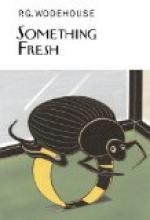“It seems to me, my dear fellow,” he said, “the only explanation that will square with the facts. A shoe that is really smeared with red paint does not become black of itself in the course of a few minutes.”
“You are very right, your lordship,” said Ashe approvingly. “May I go now, your lordship?”
“Certainly—certainly; by all means.”
“Shall I take the shoe with me, your lordship?”
“If you do not want it, Baxter.”
The secretary passed the fraudulent piece of evidence to Ashe without a word; and the latter, having included both gentlemen in a kindly smile, left the garden.
On returning to the butler’s room, Ashe’s first act was to remove a shoe from the top of the pile in the basket. He was about to leave the room with it, when the sound of footsteps in the passage outside halted him.
“I do not in the least understand why you wish me to come here, my dear Baxter,” said a voice, “and you are completely spoiling my morning, but—”
For a moment Ashe was at a loss. It was a crisis that called for swift action, and it was a little hard to know exactly what to do. It had been his intention to carry the paint-splashed shoe back to his own room, there to clean it at his leisure; but it appeared that his strategic line of retreat was blocked. Plainly, the possibility—nay, the certainty—that Ashe had substituted another shoe for the one with the incriminating splash of paint on it had occurred to the Efficient Baxter almost directly the former had left the garden.
The window was open. Ashe looked out. There were bushes below. It was a makeshift policy, and one which did not commend itself to him as the ideal method, but it seemed the only thing to be done, for already the footsteps had reached the door. He threw the shoe out of window, and it sank beneath the friendly surface of the long grass round a wisteria bush.
Ashe turned, relieved, and the next moment the door opened and Baxter walked in, accompanied—with obvious reluctance—–by his bored employer.
Baxter was brisk and peremptory.
“I wish to look at those shoes again,” he said coldly.
“Certainly, sir,” said Ashe.
“I can manage without your assistance,” said Baxter.
“Very good, sir.”
Leaning against the wall, Ashe watched him with silent interest, as he burrowed among the contents of the basket, like a terrier digging for rats. The Earl of Emsworth took no notice of the proceedings. He yawned plaintively, and pottered about the room. He was one of Nature’s potterers.
The scrutiny of the man whom he had now placed definitely as a malefactor irritated Baxter. Ashe was looking at him in an insufferably tolerant manner, as if he were an indulgent father brooding over his infant son while engaged in some childish frolic. He lodged a protest.
“Don’t stand there staring at me!”




